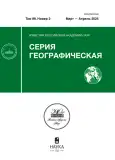Sugar agro-industrial complex of Russia: a half-century transformation
- Authors: Vasilcova A.N.1
-
Affiliations:
- Institute of Geography, Russian Academy of Sciences
- Issue: Vol 89, No 2 (2025)
- Pages: 141-154
- Section: ТЕРРИТОРИАЛЬНАЯ ОРГАНИЗАЦИЯ ОБЩЕСТВА
- URL: https://journal-vniispk.ru/2587-5566/article/view/318366
- DOI: https://doi.org/10.31857/S2587556625020013
- ID: 318366
Cite item
Abstract
About the authors
A. N. Vasilcova
Institute of Geography, Russian Academy of Sciences
Email: vasilcova-anna@yandex.ru
Moscow, Russia
References
- Afanasʼev A.A. Development management of sugar industry (on the example of Tatarstan Republic enterprises). Cand. Sci. (Econ.) Dissertation. Izhevsk: Udm. Gov. Univ., 2007. 182 p.
- Bolokhontseva Yu.I., Saltyk I.P. Processing of raw sugar in the Central Chernozem region as one of the effective output levers its beet sugar sub-complex from the crisis. Vestn. KGSA, 2023, no. 7, pp. 188–194. (In Russ.).
- Gatina F.F. The main directions of economic efficiency increasing of the beet sugar agroindustrial subcomplex. Cand. Sci. (Econ.) Dissertation. Kazan: Kaz. Gov. Agr. Akad., 2001. 187 p.
- Kalinicheva E.Yu., Uvarova M.N., Zhilina L.N. Economic prerequisites for the formation of optimal sugar mills raw zones of the Orel region. Vestn. Agrar. Nauki, 2020, no. 5, pp. 123–129. (In Russ.). https://doi.org/10.17238/issn2587-666X.2020.5.123
- Khudyakova T.M., Voinova N.E. Value of sugar production for sustainable economic areas development of TsChER. Vestn. Tamb. Univ., Ser.: Est. Tekhn. Nauki, 2013, vol. 18, no. 2, pp. 718–722. (In Russ.).
- Matveev E.V., Matveeva G.I. The influence of agricultural holdings on sugar beet production in the Voronezh region. In Agrarnaya geografiya v sovremennom mire [Agricultural Geography in the Modern World]. Krasnodar: KGU, 2014, pp. 260–262. (In Russ.).
- Mikhailushkina A.A. Prospects for the development of the sugar agro-industrial subcomplex (on the example of the Krasnodar region). Extended Abstract of Cand. Sci. (Econ.) Dissertation. Krasnodar: Kuban. Gos. Agr. Univ., 2007. 24 p.
- Nefedova T.G. Twenty-five years of Russia’s post-Soviet agriculture: Geographical trends and contradictions. Reg. Res. Russ., 2017, vol. 7, no. 4, pp. 311–321. https://doi.org/10.1134/S2079970517040074
- Novachenko Yu.F. Regional industrial complex: Tendencies and the prospects of development (on materials of sugar industry of Kursk region). Izv. YuZGU, Ser.: Ekon. Sotsiol. Menedzh., 2016, no. 3, pp. 223–231. (In Russ.).
- Pidgeon J.D., Werker A.R., Jaggard K.W., et al. Climatic impact on the productivity of sugar beet in Europe, 1961–1995. Agric. For. Meteorol., 2001, no. 109, pp. 27–37.
- Sabetova L.A., Larshina T.L. Integration development in sugar beet subcomplex. In Razvitie selʼskokhozyaistvennoi kooperatsii: Sbornik nauchnykh trudov [The Development of Agricultural Cooperation: A Collection of Scientific Papers]. Michurinsk: MGAU, 2016, pp. 32–41. (In Russ.).
- Sabetova L.A., Larshina T.L. Assessment of efficiency of functioning of industries of the regional sugar beet subcomplex. In Dostizheniya i perspektivy nauchno-innovatsionnogo razvitiya APK [Achievements and Prospects of Scientific and Innovative Development of the Agro-Industrial Complex]. Kurgan: KGSA, 2020, pp. 270–273. (In Russ.).
- Saltyk I.P., Gorobets Zh.A., Bolokhontseva Yu.I. Organizational structures of sugar beet agro-industrial formations. Reg. Ekon.: Teor. Prakt., 2010, no. 3, pp. 61–76. (In Russ.).
- Saltyk I.P., Ibragimov R.M., Glebova I.A., Kosulin G.S., Bolokhontseva Yu.I., Muzalev I.I. The development of the sugar beet sub complex of Kursk region in conditions of formation of market relations. Vestn. KGSA, 2018, no. 5, pp. 177–184. (In Russ.).
- Saltyk I.P., Bolokhontseva Yu.I., Grankin V.F., Boev S.G. Effectiveness of functioning beet sugar sub-complex of agricultural industry of the Central Chernozem region. Vestn. KGSA, 2023, no. 6, pp. 191–200. (In Russ.).
- Sapronov A.R. Tekhnologiya sakharnogo proizvodstva [Sugar Production Technology]. Moscow: Kolos Publ., 1999. 495 p.
- Soloshenko R.V., Zyukin D.A., Vydrina O.N. Trends of development and prospects of production of sugar beet factory in main beet producing regions of the country. Vestn. KGSA, 2016, no. 9, pp. 27–31. (In Russ.).
- Sturua A.V. The development program of the beet sugar subcomplex of the Russian Federation. APK: Ekon., Upravl., 2010, no. 8, pp. 58–63. (In Russ.).
- Svyatova O.V. Strengthening Russia food security in the sugar. Vopr. Sots.-Ekon. Razv. Reg., 2018, no. 1, pp. 7–20. (In Russ.).
- Uvarova M.N., Pavlova T.A., Uvarov D.V. The effective functioning of the sugar industry on the basis of optimization of the primary areas of sugar factories. Vestn. OGAU, 2016, no. 6, pp. 49–57. (In Russ.). https://doi.org/10.15217/issn1990-3618.2016.6.49
- Veklenko V.I. Trends in the development and sustainability of sugar beet production in the leading countries and regions of the Russian Federation. Vestn. KGSA, 2022, no. 2, pp. 114–122. (In Russ.).
- Veklenko V.I., Pigorev R.E., Belkin R.E., Chernikov E.I., Soloshenko V.M. Analysis of the sugar beet processing state in the TsChR regions. Vestn. KGSA, 2012, no. 7, pp. 21–24. (In Russ.).
- Voinova N.E. Sveklosakharnoe proizvodstvo Kurskoi oblasti: territorialʼnaya organizatsiya i effektivnostʼ razvitiya [Sugar Beet Production in the Kursk Region: Territorial Organization and Development Efficiency]. Kursk: Izd-vo KGPU, 2002. 142 p.
- Voronina V.M., Mikhailova O.P. Sugar production and consumption in Russia: A situation analysis. Ekon. Nauki, 2022, no. 4, pp. 32–38. (In Russ.). https://doi.org/10.14451/1.209.32
- Zyukin D.A., Svyatova O.V. Sugar beet production in Russia: Leading regions and influencing factors. Vestn. KGSA, 2023, no. 3, pp. 147–152. (In Russ.).
- Zyukin D.A., Svyatova O.V., Soloshenko R.V., Dorogavtseva I.G. About the directions to increase the role of the sugar-beet subcomplex in the structure of regional AIC. Azimut Nauch. Issled.: Ekon. Upr., 2017, vol. 6, no. 3, pp. 156–159. (In Russ.).
- Zyukin D.A., Svyatova O.V., Soloshenko R.V., Vydrina O.N., Dorogavtseva I.G. Perspective of the sugar beet subcomplex development in Kursk region. Innov. APK: Probl. Persp., 2016, no. 3, pp. 55–64. (In Russ.).
Supplementary files









